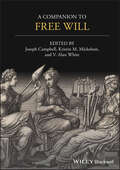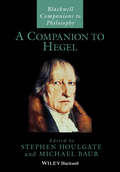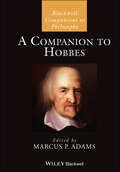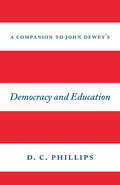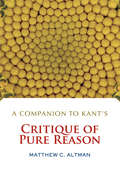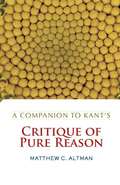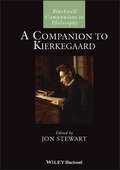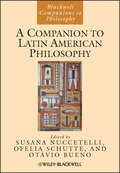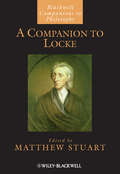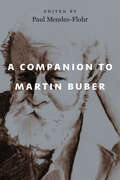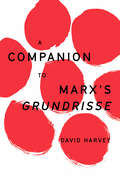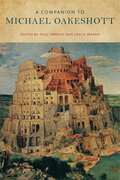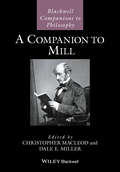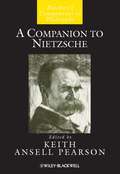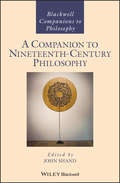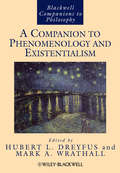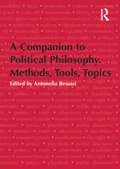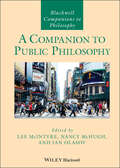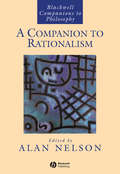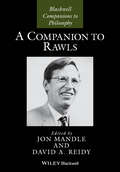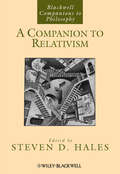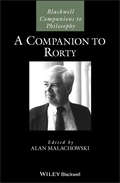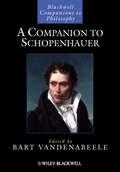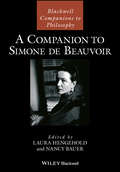- Table View
- List View
A Companion to Free Will (Blackwell Companions to Philosophy)
by Kristin M. Mickelson V. Alan White Joe CampbellProvides a comprehensive, cutting-edge, and accessible accompaniment to various narratives about free will A Companion to Free Will is an indispensable resource for anyone interested in the philosophy of free will, offering an authoritative survey of perennial issues and contemporary debates within the field. Bringing together the work of a diverse team of established and younger scholars, this well-balanced volume offers innovative perspectives and fresh approaches to the classical compatibility problem, moral and legal responsibility, consciousness in free action, action theory, determinism, logical fatalism, impossibilism, and much more. The Companion’s 30 chapters provide general coverage of the discipline as well as an in-depth exploration of both CAP (Classical Analytic Paradigm) and non-CAP perspectives on the problem of free will and the problem of determinism—raising new questions about what the free will debate is, or should be, about. Throughout the book, coverage of modern exchanges between the world’s leading philosophers is complemented by incisive commentary, novel insights, and selections that examine compatibilist, libertarian, and denialist viewpoints. Offers a balanced presentation of conflicting theories and ongoing debates about the nature, existence, and implications of free will Explores the role of scientific advances and empirical methods in contributing to discourses on free will and action theory Reviews new developments in longstanding arguments between compatibilist and incompatibilist approaches to free will including those that question this way of framing the debate and critique the standard terminology Discusses descriptive, revisionary, and pragmatic approaches for defining key concepts and addressing compatibility problems surrounding free will Considers various issues of moral responsibility and philosophical approaches to the problem of free will in new waysPart of the acclaimed Blackwell Companions to Philosophy series, A Companion to Free Will is essential reading for undergraduate and graduate students of philosophy, professional philosophers and theorists, and interested novices alike.
A Companion to Hegel
by Michael Baur Stephen HoulgateThis companion provides original, scholarly, and cutting-edge essays that cover the whole range of Hegel's mature thought and his lasting influence.A comprehensive guide to one of the most important modern philosophersEssays are written in an accessible manner and draw on the most up-to-date Hegel researchContributions are drawn from across the world and from a wide variety of philosophical approaches and traditionsExamines Hegel's influence on a range of thinkers, from Kierkegaard and Marx to Heidegger, Adorno and DerridaBegins with a chronology of Hegel's life and work and is then split into sections covering topics such as Philosophy of Nature, Aesthetics, and Philosophy of Religion
A Companion to Hobbes (Blackwell Companions to Philosophy)
by Marcus P. AdamsOffers comprehensive treatment of Thomas Hobbes’s thought, providing readers with different ways of understanding Hobbes as a systematic philosopher As one of the founders of modern political philosophy, Thomas Hobbes is best known for his ideas regarding the nature of legitimate government and the necessity of society submitting to the absolute authority of sovereign power. Yet Hobbes produced a wide range of writings, from translations of texts by Homer and Thucydides, to interpretations of Biblical books, to works devoted to geometry, optics, morality, and religion. Hobbes viewed himself as presenting a unified method for theoretical and practical science—an interconnected system of philosophy that provides many entry points into his thought. A Companion to Hobbes is an expertly curated collection of essays offering close textual engagement with the thought of Thomas Hobbes in his major works while probing his ideas regarding natural philosophy, mathematics, human nature, civil philosophy, religion, and more. The Companion discusses the ways in which scholars have tried to understand the unity and diversity of Hobbes’s philosophical system and examines the reception of the different parts of Hobbes’s philosophy by thinkers such as René Descartes, Margaret Cavendish, David Hume, and Immanuel Kant. Presenting a diversity of fresh perspectives by both emerging and established scholars, this volume: Provides a comprehensive treatment of Hobbes’s thought in his works, including Elements of Law, Elements of Philosophy, and Leviathan Explores the connecting points between Hobbes’ metaphysics, epistemology, mathematics, natural philosophy, morality, and civil philosophy Offers readers strategies for understanding how the parts of Hobbes’s philosophical system fit together Examines Hobbes’s philosophy of mathematics and his attempts to understand geometrical objects and definitions Considers Hobbes’s philosophy in contexts such as the natural state of humans, gender relations, and materialist worldviews Challenges conceptions of Hobbes’s moral theory and his views about the rights of sovereigns Part of the acclaimed Blackwell Companions to Philosophy series, A Companion to Hobbes is an invaluable resource for scholars and advanced students of Early modern thought, particularly those from disciplines such as History of Philosophy, Political Philosophy, Intellectual History, History of Politics, Political Theory, and English.
A Companion to John Dewey's Democracy and Education
by D.C. PhillipsThis year marks the centenary publication of John Dewey’s magnum opus, Democracy and Education. Despite its profound importance as a foundational text in education, it is notoriously difficult and—dare we say it—a little dry. In this charming and often funny companion, noted philosopher of education D. C. Phillips goes chapter by chapter to bring Dewey to a twenty-first-century audience. Drawing on over fifty years of thinking about this book—and on his own experiences as an educator—he lends it renewed clarity and a personal touch that proves its lasting importance. Phillips bridges several critical pitfalls of Democracy and Education that often prevent contemporary readers from fully understanding it. Where Dewey sorely needs a detailed example to illustrate a point—and the times are many—Phillips steps in, presenting cases from his own classroom experiences. Where Dewey casually refers to the works of people like Hegel, Herbart, and Locke—common knowledge, apparently, in 1916—Phillips fills in the necessary background. And where Dewey gets convoluted or is even flat-out wrong, Phillips does what few other scholars would do: he takes Dewey to task. The result is a lively accompaniment that helps us celebrate and be enriched by some of the most important ideas ever offered in education.
A Companion to Kant's Critique of Pure Reason
by Matthew C. AltmanImmanuel Kant's groundbreaking Critique of Pure Reason inaugurated a new way of understanding the world that continues to impact philosophy to the present day. With clear explanations and numerous examples, A Companion to Kant's Critique of Pure Reason takes students step by step through the book in a way that captures their interest without sacrificing depth or intellectual rigor. Although it is informed by recent Anglo-American scholarship, the Companion focuses on Kant's own arguments rather than secondary texts and scholarly debates that may otherwise distract from what Kant himself is attempting. The Companion first places the Critique in its historical and philosophical context before addressing the three main parts of the book in order: the Transcendental Aesthetic, the Transcendental Analytic, and the Transcendental Dialectic. The Companion also briefly explains how Kant continues his investigation into God, freedom, and immortality in the Critique of Practical Reason, and it concludes with an assessment of Kant's importance in the history of modern philosophy. Key features include a glossary of technical terms, with succinct definitions and cross-references, as well as an annotated bibliography of the most important English-language secondary sources on Kant's theoretical philosophy.
A Companion to Kant's: Critique of Pure Reason
by Matthew C. AltmanImmanuel Kant's groundbreaking Critique of Pure Reason inaugurated a new way of understanding the world that continues to impact philosophy to the present day. <P><P>With clear explanations and numerous examples, A Companion to Kant's "Critique of Pure Reason" takes students step by step through the book in a way that captures their interest without sacrificing depth or intellectual rigor. Although it is informed by recent Anglo-American scholarship, the Companion focuses on Kant's own arguments rather than secondary texts and scholarly debates that may otherwise distract from what Kant himself is attempting. The Companion first places the Critique in its historical and philosophical context before addressing the three main parts of the book in order: the Transcendental Aesthetic, the Transcendental Analytic, and the Transcendental Dialectic. The Companion also briefly explains how Kant continues his investigation into God, freedom, and immortality in the Critique of Practical Reason, and it concludes with an assessment of Kant's importance in the history of modern philosophy. Key features include a glossary of technical terms, with succinct definitions and cross-references, as well as an annotated bibliography of the most important English-language secondary sources on Kant's theoretical philosophy.
A Companion to Kierkegaard
by Jon StewartJon Stewart, one of the world s leading experts on the work of Søren Kierkegaard, has here compiled the most comprehensive single-volume overview of Kierkegaard studies currently available. Includes contributions from an international array of Kierkegaard scholars from across the disciplines Covers all of the major disciplines within the broad field of Kierkegaard research, including philosophy; theology and religious studies; aesthetics, the arts and literary theory; and social sciences and politics Elucidates Kierkegaard s contribution to each of these areas through examining the sources he drew upon, charting the reception of his ideas, and analyzing his unique conceptual insights into each topic Demystifies the complex field of Kierkegaard studies creating an accessible entry-point into his thought and writings for readers new to his work
A Companion to Latin American Philosophy
by Susana Nuccetelli Ofelia Schutte Otávio BuenoThis comprehensive collection of original essays written by an international group of scholars addresses the central themes in Latin American philosophy.Represents the most comprehensive survey of historical and contemporary Latin American philosophy available todayComprises a specially commissioned collection of essays, many of them written by Latin American authorsExamines the history of Latin American philosophy and its current issues, traces the development of the discipline, and offers biographical sketches of key Latin American thinkersShowcases the diversity of approaches, issues, and styles that characterize the field
A Companion to Locke (Blackwell Companions to Philosophy)
by Matthew StuartThis collection of 28 original essays examines the diverse scope of John Locke’s contributions as a celebrated philosopher, empiricist, and father of modern political theory. Explores the impact of Locke’s thought and writing across a range of fields including epistemology, metaphysics, philosophy of science, political theory, education, religion, and economics Delves into the most important Lockean topics, such as innate ideas, perception, natural kinds, free will, natural rights, religious toleration, and political liberalism Identifies the political, philosophical, and religious contexts in which Locke’s views developed, with perspectives from today’s leading philosophers and scholars Offers an unprecedented reference of Locke’s contributions and his continued influence
A Companion to Martin Buber
by Paul Mendes-FlohrA definitive, international guide to the thought of the most important twentieth-century Jewish philosopher. In his 1923 essay, I and Thou, the philosopher, theologian, and activist Martin Buber introduced a philosophy of dialogue that achieved a global, interdisciplinary resonance. For Buber, dialogue was more than a conversation; dialogue discloses something essential about our orientation and our lives with one another. This companion assembles twenty-six scholars from a dozen countries to explore Buber’s international reputation and legacy in education, interfaith relations, Judaism, philosophy, politics, and psychology. The result is an essential guide to one of the most influential Jewish thinkers of the twentieth century.
A Companion to Marx's Grundrisse
by David HarveyDavid Harvey tackles Marx's notebooks that have spawned wide-ranging and raging controversiesWhen leading scholar of Marx, Roman Rosdolsky, first encountered the virtually unknown text of Marx&’s Grundrisse - his preparatory work for his masterpiece Das Capital - in the 1950s in New York Public Library, he recognized it as &“a work of fundamental importance,&” but declared &“its unusual form&” and &“obscure manner of expression, made it far from suitable for reaching a wide circle of readers.&”David Harvey&’s Companion to Marx&’s Grundrisse builds upon his widely acclaimed companions to the first and second volumes of Capital in a way that will reach as wide an audience as possible. Marx&’s stated ambition for this text - where he was thinking aloud about some of possible metamorphoses of capitalism - is to reveal &“the exact development of the concept of capital as the fundamental concept of modern economics, just as capital itself is the foundation of bourgeois society.&” While respecting Marx&’s desire to &“bring out all the contradictions of bourgeois production, as well as the boundary where it drives beyond itself,&” David Harvey also pithily illustrates the relevance of Marx&’s text to understanding the troubled state of contemporary capitalism.
A Companion to Michael Oakeshott
by Paul Franco Leslie MarshMichael Oakeshott has long been recognized as one of the most important political philosophers of the twentieth century, but until now no single volume has been able to examine all the facets of his wide-ranging philosophy with sufficient depth, expertise, and authority. The essays collected here cover all aspects of Oakeshott’s thought, from his theory of knowledge and philosophies of history, religion, art, and education to his reflections on morality, politics, and law. Aside from the editors, the contributors are Corey Abel, David Boucher, Elizabeth Corey, Robert Devigne, Timothy Fuller, Steven Gerencser, Robert Grant, Noel Malcolm, Kenneth McIntyre, Kenneth Minogue, Noël O’Sullivan, Geoffrey Thomas, and Martyn Thompson.
A Companion to Michael Oakeshott
by Paul Franco, Leslie MarshMichael Oakeshott has long been recognized as one of the most important political philosophers of the twentieth century, but until now no single volume has been able to examine all the facets of his wide-ranging philosophy with sufficient depth, expertise, and authority. The essays collected here cover all aspects of Oakeshott’s thought, from his theory of knowledge and philosophies of history, religion, art, and education to his reflections on morality, politics, and law. Aside from the editors, the contributors are Corey Abel, David Boucher, Elizabeth Corey, Robert Devigne, Timothy Fuller, Steven Gerencser, Robert Grant, Noel Malcolm, Kenneth McIntyre, Kenneth Minogue, Noël O’Sullivan, Geoffrey Thomas, and Martyn Thompson.
A Companion to Mill (Blackwell Companions to Philosophy #163)
by Dale E. Miller Christopher MacleodThis Companion offers a state-of-the-art survey of the work of John Stuart Mill – one which covers the historical influences on Mill, his theoretical, moral and social philosophy, as well as his relation to contemporary movements. Its contributors include both senior scholars with established expertise in Mill’s thought and new emerging interpreters. Each essay acts as a ‘go-to’ resource for those seeking to understand an aspect of Mill’s thought or to familiarise themselves with the contours of a debate within the scholarship. <p><p> The Companion is a key reference on Mill’s theory of liberty and utilitarianism, but also provides a valuable resource on lesser-known aspects of his work, including his epistemology, metaphysics, and philosophy of language. The volume is divided into six sections. Part I covers Mill’s life, his immediate posthumous reputation, and his own telling of his life-story. Part II brings together an accessible and comprehensive summary of the various influences on Mill’s thought. Part III offers an account of the foundations of Mill’s philosophy and his thought on key philosophic topics. Parts IV and V tackle issues from Mill’s moral and social philosophy. Part VI concludes with a treatment of the broader aspects of Mill’s thought, tracing his relation to major movements in philosophy.
A Companion to Nietzsche (Blackwell Companions to Philosophy #120)
by Keith Ansell PearsonA Companion to Nietzsche provides a comprehensive guide to all the main aspects of Nietzsche's philosophy, profiling the most recent research and trends in scholarship. Brings together an international roster of both rising stars and established scholars, including many of the leading commentators and interpreters of Nietzsche. Showcases the latest trends in Nietzsche scholarship, such as the renewed focus on Nietzsche’s philosophy of time, of nature, and of life. Includes clearly organized sections on Art, Nature, and Individuation; Nietzsche's New Philosophy of the Future; Eternal Recurrence, the Overhuman, and Nihilism; Philosophy of Mind; Philosophy and Genealogy; Ethics; Politics; Aesthetics; Evolution and Life. Features fresh treatments of Nietzsche’s core and enigmatic doctrines.
A Companion to Nineteenth-Century Philosophy (Blackwell Companions to Philosophy)
by John ShandInvestigate the challenging and nuanced philosophy of the long nineteenth century from Kant to Bergson Philosophy in the nineteenth century was characterized by new ways of thinking, a desperate searching for new truths. As science, art, and religion were transformed by social pressures and changing worldviews, old certainties fell away, leaving many with a terrifying sense of loss and a realization that our view of things needed to be profoundly rethought. The Blackwell Companion to Nineteenth-Century Philosophy covers the developments, setbacks, upsets, and evolutions in the varied philosophy of the nineteenth century, beginning with an examination of Kant’s Transcendental Idealism, instrumental in the fundamental philosophical shifts that marked the beginning of this new and radical age in the history of philosophy. Guiding readers chronologically and thematically through the progression of nineteenth-century thinking, this guide emphasizes clear explanation and analysis of the core ideas of nineteenth-century philosophy in an historically transitional period. It covers the most important philosophers of the era, including Hegel, Fichte, Schopenhauer, Mill, Kierkegaard, Marx, Nietzsche, Bradley, and philosophers whose work manifests the transition from the nineteenth century into the modern era, such as Sidgwick, Peirce, Husserl, Frege and Bergson. The study of nineteenth-century philosophy offers us insight into the origin and creation of the modern era. In this volume, readers will have access to a thorough and clear understanding of philosophy that shaped our world.
A Companion to Phenomenology and Existentialism
by Mark A. Wrathall Hubert L. DreyfusA Companion to Phenomenology and Existentialism is a complete guide to two of the dominant movements of philosophy in the twentieth century.Written by a team of leading scholars, including Dagfinn Føllesdal, J. N. Mohanty, Robert Solomon, Jean-Luc MarionHighlights the area of overlap between the two movementsFeatures longer essays discussing each of the main schools of thought, shorter essays introducing prominent themes, and problem-oriented chaptersOrganised topically, around concepts such as temporality, intentionality, death and nihilismFeatures essays on unusual subjects, such as medicine, the emotions, artificial intelligence, and environmental philosophy
A Companion to Political Philosophy. Methods, Tools, Topics
by Antonella BesussiThis book offers a comprehensive overview of the key concepts and issues of contemporary political philosophy, providing an essential reference work for scholars and advanced students. It is structured in three parts, covering methodological issues; tools and argumentative strategies employed by political philosophy; and concepts and topics key to the discipline. Expert authors from around the world have written twenty chapters in a consistent and engaging style. Each chapter is thoroughly cross-referenced allowing students to appreciate how methodological issues relate to each other, and how methodology and argumentative tools affect the way substantial issues are addressed. The chapters are supplemented by further reading lists and selected bibliographies to aid further research. The companion will be required reading for masters and post-doctoral students, providing them with the appropriate tools for approaching political philosophy in a more thoughtful way, and showing how substantive topics are addressed within different perspectives and paradigms. The companion also provides upper-level undergraduates with a sophisticated introduction to the relevant problems and challenges political philosophy addresses.
A Companion to Public Philosophy (Blackwell Companions to Philosophy)
by Lee McIntyre Ian Olasov Nancy McHughThe first anthology devoted to the theory and practice of all forms of public philosophy A Companion to Public Philosophy brings together in a single volume the diverse practices, modalities, and perspectives of this rapidly growing field. Forty-two chapters written by established practitioners and newer voices alike consider questions ranging from the definition of public philosophy to the value of public philosophy to both society and philosophy itself. Throughout the book, philosophers offer insights into the different publics they have engaged, the topics they have explored, the methods they have used and the lessons they have learned from these engagements. The Companion explores important philosophical issues concerning the practice of philosophy in the public sphere, how public philosophy relates to advocacy, philosophical collaborations with political activists, locations where public philosophy can be done, and more. Many essays highlight underserved topics such as effective altruism, fat activism, trans activism, indigenous traditions, and Africana philosophy, while other essays set the stage for rigorous debates about the boundaries of public philosophy and its value as a legitimate way to do philosophy. Discusses the range of approaches that professional philosophers can use to engage with non-academic audiences Explores the history and impact of public philosophy from the time of Socrates to the modern era Highlights the work of public philosophers concerning issues of equity, social justice, environmentalism, and medical ethics Covers the modalities used by contemporary public philosophers, including film and television, podcasting, internet memes, and community-engaged teaching Includes essays by those who bring philosophy to corporations, government policy, consulting, American prisons, and activist groups across the political spectrumA Companion to Public Philosophy is essential reading for philosophers from all walks of life who are invested in and curious about the ways that philosophy can impact the public and how the public can impact philosophy. It is also an excellent text for undergraduate and graduate courses on the theory and practice of public philosophy as well as broader courses on philosophy, normative ethics, and comparative and world philosophy.
A Companion to Rationalism (Blackwell Companions to Philosophy #38)
by Alan NelsonThis book is a wide-ranging examination of rationalist thought in philosophy from ancient times to the present day. Written by a superbly qualified cast of philosophers Critically analyses the concept of rationalism Focuses principally on the golden age of rationalism in the seventeenth and early eighteenth centuries Also covers ancient rationalism, nineteenth-century rationalism, and rationalist themes in recent thought Organised chronologically Various philosophical methods and viewpoints are represented
A Companion to Rawls (Blackwell Companions to Philosophy)
by Jon Mandle David A. ReidyWide ranging and up to date, this is the single most comprehensive treatment of the most influential political philosopher of the 20th century, John Rawls. An unprecedented survey that reflects the surge of Rawls scholarship since his death, and the lively debates that have emerged from his work Features an outstanding list of contributors, including senior as well as “next generation” Rawls scholars Provides careful, textually informed exegesis and well-developed critical commentary across all areas of his work, including non-Rawlsian perspectives Includes discussion of new material, covering Rawls’s work from the newly published undergraduate thesis to the final writings on public reason and the law of peoples Covers Rawls’s moral and political philosophy, his distinctive methodological commitments, and his relationships to the history of moral and political philosophy and to jurisprudence and the social sciences Includes discussion of his monumental 1971 book, A Theory of Justice, which is often credited as having revitalized political philosophy
A Companion to Relativism (Blackwell Companions To Philosophy Ser. #110)
by Steven D. HalesA Companion to Relativism presents original contributions from leading scholars that address the latest thinking on the role of relativism in the philosophy of language, epistemology, ethics, philosophy of science, logic, and metaphysics. Features original contributions from many of the leading figures working on various aspects of relativism Presents a substantial, broad range of current thinking about relativism Addresses relativism from many of the major subfields of philosophy, including philosophy of language, epistemology, ethics, philosophy of science, logic, and metaphysics
A Companion to Rorty (Blackwell Companions to Philosophy)
by Alan MalachowskiA groundbreaking reference work on the revolutionary philosophy and intellectual legacy of Richard Rorty A provocative and often controversial thinker, Richard Rorty and his ideas have been the subject of renewed interest to philosophers working in epistemology, metaphysics, analytic philosophy, and the history of philosophy. Having called for philosophers to abandon representationalist accounts of knowledge and language, Rorty introduced radical and challenging concepts to modern philosophy, generating divisive debate through the new form of American pragmatism which he advocated and the renunciation of traditional epistemology which he espoused. However, while Rorty has been one of the most widely-discussed figures in modern philosophy, few volumes have dealt directly with the expansive reach of his thought or its implications for the fields of philosophy in which he worked. The Blackwell Companion to Rorty is a collection of essays by prominent scholars which provide close, and long-overdue, examination of Rorty’s groundbreaking work. Divided into five parts, this volumecovers the major intellectual movements of Rorty’s career from his early work on consciousness and transcendental arguments, to the lasting impacts of his major writings, to his approach to pragmatism and his controversial appropriations from other philosophers, and finally to his later work in culture, politics, and ethics. Offers a comprehensive, balanced, and insightful account of Rorty's approach to philosophy Provides an assessment of Rorty’s more controversial thoughts and his standing as an “anti-philosopher’s philosopher” Contains new and original exploration of Rorty’s thinking from leading scholars and philosophers Includes new perspectives on topics such as Rorty's influence in Central Europe Despite the relevance of Rorty’s work for the wider community of philosophers and for those working in fields such as international relations, legal and political theory, sociology, and feminist studies, the secondary literature surrounding Rorty’s work and legacy is limited. A Companion to Rorty address this absence, providinga comprehensive resource for philosophers and general readers.
A Companion to Schopenhauer (Blackwell Companions to Philosophy #123)
by Bart VandenabeeleA Companion to Schopenhauer provides a comprehensive guide to all the important facets of Schopenhauer’s philosophy. The volume contains 26 newly commissioned essays by prominent Schopenhauer scholars working in the field today. A thoroughly comprehensive guide to the life, work, and thought of Arthur Schopenhauer Demonstrates the range of Schopenhauer’s work and illuminates the debates it has generated 26 newly commissioned essays by some of the most prominent Schopenhauer scholars working today reflect the very latest trends in Schopenhauer scholarship Covers the full range of historical and philosophical perspectives on Schopenhauer’s work Discusses his seminal contributions to our understanding of knowledge, perception, morality, science, logic and mathematics, Platonic Ideas, the unconscious, aesthetic experience, art, colours, sexuality, will, compassion, pessimism, tragedy, pleasure, and happiness
A Companion to Simone de Beauvoir
by Nancy Bauer Laura HengeholdThe work of Simone de Beauvoir has endured and flowered in the last two decades, thanks primarily to the lasting influence of The Second Sex on the rise of academic discussions of gender, sexuality, and old age. Now, in this new Companion dedicated to her life and writings, an international assembly of prominent scholars, essayists, and leading interpreters reflect upon the range of Beauvoir’s contribution to philosophy as one of the great authors, thinkers, and public intellectuals of the twentieth century. The Companion examines Beauvoir’s rich intellectual life from a variety of angles—including literary, historical, and anthropological perspectives—and situates her in relation to her forbears and contemporaries in the philosophical canon. Essays in each of four thematic sections reveal the breadth and acuity of her insight, from the significance of The Second Sex and her work on the metaphysics of gender to her plentiful contributions in ethics and political philosophy. Later chapters trace the relationship between Beauvoir’s philosophical and literary work and open up her scholarship to global issues, questions of race, and the legacy of colonialism and sexism. The volume concludes by considering her impact on contemporary feminist thought writ large, and features pioneering work from a new generation of Beauvoir scholars. Ambitious and unprecedented in scope, A Companion to Simone de Beauvoir is an accessible and interdisciplinary resource for students, teachers, and researchers across the humanities and social sciences.
